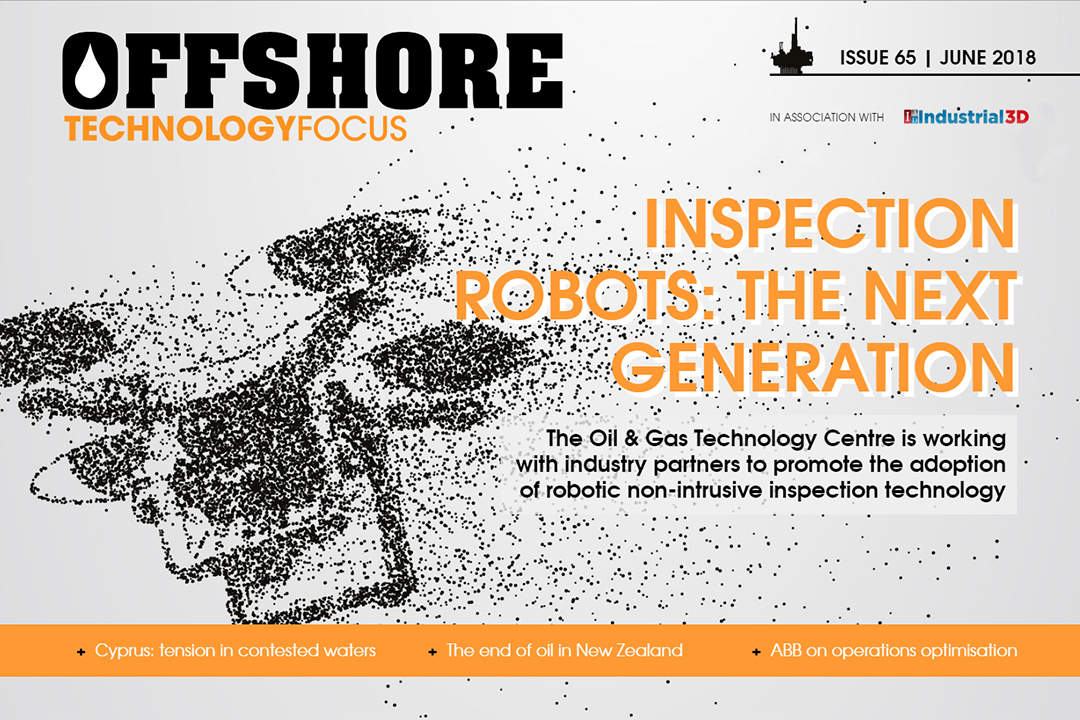
The UK Oil & Gas Technology Centre has invested in three robotic technologies to help transform pressure vessel inspection on offshore rigs. We find out how the systems being developed could help reduce costs and improve safety in this vital task that currently requires full shutdown and manual inspection.
In this issue we also take a look at the tension between Cyprus and Turkey over oil and gas deposits in a contested region off the island’s coast, take a look inside the growing US oil production market, and ask what New Zealand’s ban on new oil and gas exploration permits will mean for the industry.
Plus, we check out a Norwegian-developed well-sealing technology using “artificial” magma to fuse infrastructure to surrounding rock, speak to ABB about optimising operations, and track the growing number of climate change-related lawsuits against major oil companies.
In this issue
Cyprus: tensions grow as contested waters yield promising results
Tensions over natural gas and oil deposits in the sea off Cyprus threatened to boil over this March after Turkey sent a drill ship to the contested region. So what is at stake here and how likely is it that oil will begin flowing anytime soon? Patrick Kingsland finds out.
America’s march to become the world’s biggest oil producer
Last November, US oil production reached the highest level since 1970, pumping more than ten million barrels of crude oil a day. Analysts say the US is likely to achieve the top oil producer spot, but what does this mean for the offshore industry and the oil price more generally? Heidi Vella investigates.
An end to oil exploration in New Zealand
New Zealand has banned new oil and gas exploration permits as part of a broader effort to cut greenhouse gas emissions and slow climate change. Molly Lempriere asks what the move means for the industry and is it really beneficial to the environment?
Understanding offshore operations optimisation with ABB
With an unstable oil market, operators are seeking to optimise operations to make up for price fluctuations and increase cost-efficiencies. Alexander Love spoke to Espen Storkaas, ABB group vice-president for offshore oil and gas digital, at the company’s Collaboration Operations Center in Oslo, Norway, to discuss how these relatively new technologies are transforming operations for the offshore industry and making automation a reality.
Enter the robots: reducing the headache of pressure vessel inspection
The UK Oil & Gas Technology Centre has invested in three robotic technologies to help transform pressure vessel inspection on offshore rigs. Ross Davies looks at how these new projects might help turn a traditionally burdensome undertaking into a more cost-efficient and safer task.
Artificial magma: Could it work for sealing offshore wells?
Interwell Norway has developed a new well-sealing technology that simulates mini-volcanoes to produce artificial magma then used to supress leaks. Having already been piloted on onshore wells in Canada, could it be applied in an offshore setting? Ross Davies sits down with the technology’s inventor, Michael Skjold, to find out more.
Industry in the dock: the rise in climate lawsuits against big oil
The number of climate change-related lawsuits filed against oil and gas companies has boomed over the last few years. Offshore Technology tracks the growth in climate suits, the demands of cities and the potential outcomes.
Next issue preview
US President Trump’s recent decision to pull out of the Iran deal has, as expected, rocked the oil industry and sent the price per barrel above $80. We take a look at the fallout from this move, and chart a timeline of other geopolitical events that have rocked the oil industry.
In April, Statoil began laying a cable that will supply onshore power from Norway to the gigantic Johan Sverdrup field, a technological feat that will make it one of the oil fields with the lowest CO2 emissions. We take a look at this project and find out how oil fields are conventionally powered.
Also in the next issue, we speak to ABB about the Subsea Power Joint Industry Program which aims to relocate production facilities to the seabed, map out the world’s biggest offshore gas projects, and look into the UK Health and Safety Executive’s call for better leadership in tackling gas releases in the North Sea.
Plus, we take a look at new exploration and development efforts off the coast of Nova Scotia, and speak to Lloyd’s Register about its newly launched collaborative supply chain approach to global decommissioning.
Digital magazine FAQ
Offshore Technology Focus is now available on all devices. Read it here for free in the web browser of your computer, tablet or smartphone. And to make sure you never miss an issue, sign up for a free subscription here.



